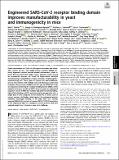Engineered SARS-CoV-2 receptor binding domain improves manufacturability in yeast and immunogenicity in mice
Author(s)
Dalvie, Neil C.; Rodriguez-Aponte, Sergio A.; Hartwell, Brittany L.; Tostanoski, Lisa H.; Biedermann, Andrew M.; Crowell, Laura E; Kaur, Kawaljit; Kumru, Ozan S.; Carter, Lauren; Yu, Jingyou; Chang, Aiquan; McMahan, Katherine; Courant, Thomas; Lebas, Celia; Lemnios, Ashley A.; Rodrigues, Kristen A.; Silva, Murillo; Johnston, Ryan S.; Naranjo, Christopher; Tracey, Mary Kate; Brady, Joseph R.; Whittaker, Charles A.; Yun, Dongsoo; Brunette, Natalie; Wang, Jing Yang; Walkey, Carl; Fiala, Brooke; Kar, Swagata; Porto, Maciel; Lok, Megan; Andersen, Hanne; Lewis, Mark G.; Love, Kerry R.; Camp, Danielle L.; Silverman, Judith Maxwell; Kleanthous, Harry; Joshi, Sangeeta B.; Volkin, David B.; Dubois, Patrice M.; Collin, Nicolas; King, Neil P.; Barouch, Dan H.; Irvine, Darrell J; Love, Christopher J.; ... Show more Show less
DownloadPublished version (1.113Mb)
Publisher Policy
Publisher Policy
Article is made available in accordance with the publisher's policy and may be subject to US copyright law. Please refer to the publisher's site for terms of use.
Terms of use
Metadata
Show full item recordAbstract
Global containment of COVID-19 still requires accessible and affordable vaccines for low- and middle-income countries (LMICs). Recently approved vaccines provide needed interventions, albeit at prices that may limit their global access. Subunit vaccines based on recombinant proteins are suited for large-volume microbial manufacturing to yield billions of doses annually, minimizing their manufacturing cost. These types of vaccines are well-established, proven interventions with multiple safe and efficacious commercial examples. Many vaccine candidates of this type for SARS-CoV-2 rely on sequences containing the receptor-binding domain (RBD), which mediates viral entry to cells via ACE2. Here we report an engineered sequence variant of RBD that exhibits high-yield manufacturability, high-affinity binding to ACE2, and enhanced immunogenicity after a single dose in mice compared to the Wuhan-Hu-1 variant used in current vaccines. Antibodies raised against the engineered protein exhibited heterotypic binding to the RBD from two recently reported SARS-CoV-2 variants of concern (501Y.V1/V2). Presentation of the engineered RBD on a designed virus-like particle (VLP) also reduced weight loss in hamsters upon viral challenge.
Date issued
2021-09Department
Massachusetts Institute of Technology. Department of Chemical Engineering; Koch Institute for Integrative Cancer Research at MIT; Massachusetts Institute of Technology. Department of Biological Engineering; Harvard University--MIT Division of Health Sciences and Technology; Massachusetts Institute of Technology. Institute for Medical Engineering & ScienceJournal
Proceedings of the National Academy of Sciences
Publisher
National Academy of Sciences
Citation
Dalvie, Neil C. et al. "Engineered SARS-CoV-2 receptor binding domain improves manufacturability in yeast and immunogenicity in mice." Proceedings of the National Academy of Sciences 118, 38 (September 2021): e2106845118.
Version: Final published version
ISSN
0027-8424
1091-6490